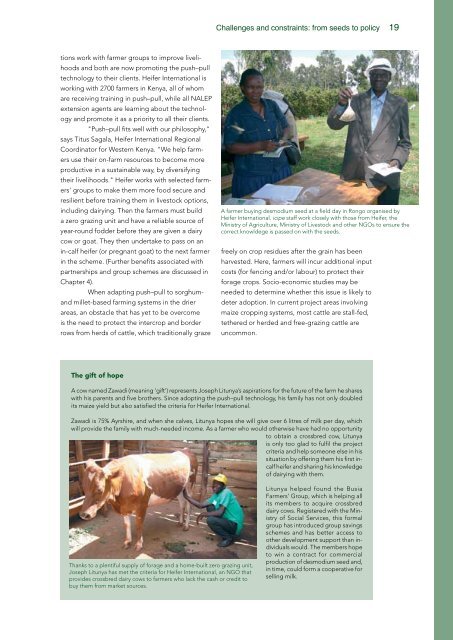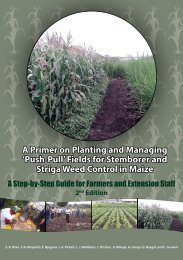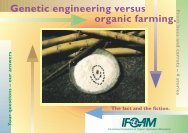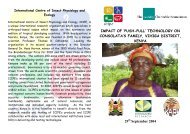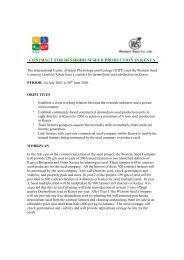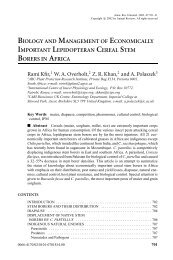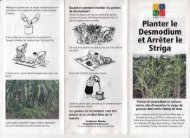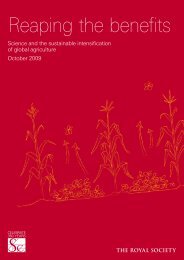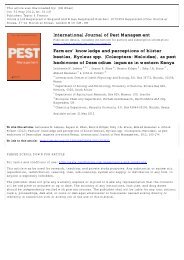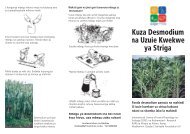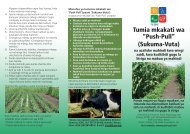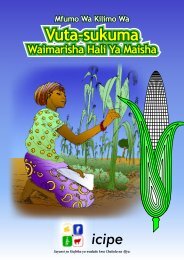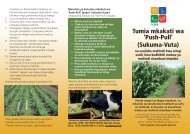a model for Africa's green revolution - Push-Pull
a model for Africa's green revolution - Push-Pull
a model for Africa's green revolution - Push-Pull
Create successful ePaper yourself
Turn your PDF publications into a flip-book with our unique Google optimized e-Paper software.
Challenges and constraints: from seeds to policy 19<br />
tions work with farmer groups to improve livelihoods<br />
and both are now promoting the push–pull<br />
technology to their clients. Heifer International is<br />
working with 2700 farmers in Kenya, all of whom<br />
are receiving training in push–pull, while all NALEP<br />
extension agents are learning about the technology<br />
and promote it as a priority to all their clients.<br />
"<strong>Push</strong>–pull fits well with our philosophy,"<br />
says Titus Sagala, Heifer International Regional<br />
Coordinator <strong>for</strong> Western Kenya. "We help farmers<br />
use their on-farm resources to become more<br />
productive in a sustainable way, by diversifying<br />
their livelihoods." Heifer works with selected farmers'<br />
groups to make them more food secure and<br />
resilient be<strong>for</strong>e training them in livestock options,<br />
including dairying. Then the farmers must build<br />
a zero grazing unit and have a reliable source of<br />
year-round fodder be<strong>for</strong>e they are given a dairy<br />
cow or goat. They then undertake to pass on an<br />
in-calf heifer (or pregnant goat) to the next farmer<br />
in the scheme. (Further benefits associated with<br />
partnerships and group schemes are discussed in<br />
Chapter 4).<br />
When adapting push–pull to sorghumand<br />
millet-based farming systems in the drier<br />
areas, an obstacle that has yet to be overcome<br />
is the need to protect the intercrop and border<br />
rows from herds of cattle, which traditionally graze<br />
A farmer buying desmodium seed at a field day in Rongo organised by<br />
Heifer International. icipe staff work closely with those from Heifer, the<br />
Ministry of Agriculture, Ministry of Livestock and other NGOs to ensure the<br />
correct knowldege is passed on with the seeds.<br />
freely on crop residues after the grain has been<br />
harvested. Here, farmers will incur additional input<br />
costs (<strong>for</strong> fencing and/or labour) to protect their<br />
<strong>for</strong>age crops. Socio-economic studies may be<br />
needed to determine whether this issue is likely to<br />
deter adoption. In current project areas involving<br />
maize cropping systems, most cattle are stall-fed,<br />
tethered or herded and free-grazing cattle are<br />
uncommon.<br />
The gift of hope<br />
A cow named Zawadi (meaning ‘gift’) represents Joseph Litunya’s aspirations <strong>for</strong> the future of the farm he shares<br />
with his parents and five brothers. Since adopting the push–pull technology, his family has not only doubled<br />
its maize yield but also satisfied the criteria <strong>for</strong> Heifer International.<br />
Zawadi is 75% Ayrshire, and when she calves, Litunya hopes she will give over 6 litres of milk per day, which<br />
will provide the family with much-needed income. As a farmer who would otherwise have had no opportunity<br />
to obtain a crossbred cow, Litunya<br />
is only too glad to fulfil the project<br />
criteria and help someone else in his<br />
situation by offering them his first incalf<br />
heifer and sharing his knowledge<br />
of dairying with them.<br />
Thanks to a plentiful supply of <strong>for</strong>age and a home-built zero grazing unit,<br />
Joseph Litunya has met the criteria <strong>for</strong> Heifer International, an NGO that<br />
provides crossbred dairy cows to farmers who lack the cash or credit to<br />
buy them from market sources.<br />
Litunya helped found the Busia<br />
Farmers’ Group, which is helping all<br />
its members to acquire crossbred<br />
dairy cows. Registered with the Ministry<br />
of Social Services, this <strong>for</strong>mal<br />
group has introduced group savings<br />
schemes and has better access to<br />
other development support than individuals<br />
would. The members hope<br />
to win a contract <strong>for</strong> commercial<br />
production of desmodium seed and,<br />
in time, could <strong>for</strong>m a cooperative <strong>for</strong><br />
selling milk.


